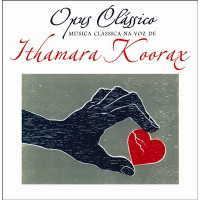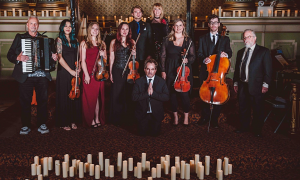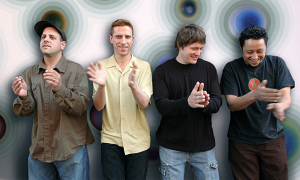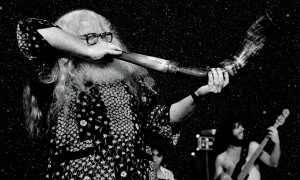Home » Jazz Articles » From the Inside Out » Raising Vision and Voice
Raising Vision and Voice
 Lili Añel
Lili Añel I Can See Bliss from Here
Wall-I Records
2013
With I Can See Bliss From Here, singer-songwriter Lili Añel presents a set of personal songs that deeply touch the listener's ear, mind and soul, and bring to mind the confessional yet universal genius of such songwriters as Tracy Chapman, Phoebe Snow and Roberta Flack—they really are that well-written. "These are the songs I want to put out to the world at this time," she says simply. "It's what I wrote. They reflect where I am right now."
I Can See Bliss From Here reflects all the hustle and bustle of Añel's own life: As her bio explains, she's "a New York-born Cuban-African American" who has lived the past decade in Philadelphia, where she befriended pianist Dale Melton, who co-produced Bliss, her sixth release. "We have much in common," Añel explains. "A love of the music by The Band, among others, and a shared ideology of community in music." (Lili and Dale are both identical twins, too.)
"Something to Do" tells the story of how she grew up in Harlem ("I was born and raised in the barrio on 110th Street," she begins) atop a chugging Latin rhythm spiced with horns. Añel then recalls her mother, who worked to support her family six days out of seven and died in her early 50s, and shares a wonderfully self-effacing (not self-pitying) verse about her shaved head and the autoimmune disease Alopecia Areata, which causes hair loss): "I shaved my head bald today. You see, most of my hair had fallen out anyway. And when people laugh at me, I just smile because I believe they're just scared it could be them instead of me."
A song to her son, "The Best Part of Me (Song for Joey)" swims in deceptively deep, shifting musical and emotional currents ("On the day that you were born, my heart melted")—a beautiful idea, beautifully played and sung.
But Bliss also lifts Añel's vision to more broad horizons. Her moaning vocal and Tom Hampton's groaning guitar scrape out the raw and ragged, tough as nails "Go Home," a contemporary blues that begins with the story of how she was "written up at work" because she "laughed too loud" but ends with her calling on the heavens to take her home for good. Liner notes by New York Music Hall of Fame Director Robbie Woliver call this "the album's biggest revelation, (is) an infectious field-holler-styled blues lament that takes modern-day work drudgery to another level."
Because this entire set is about carrying on in the face of circumstances that suggest you'd be better off packing it in, "Losing My Faith" might have been this set's title track. Its chorus is this set's most beautiful melody, and frees Añel's voice to float and soar like a songbird. It's a tribute to her creativity and spirit that Lili Añel Can See Bliss From Here.
 Club d'Elf
Club d'Elf Fire in the Brain Live at Berklee
birnCORE
2013
"To thine own self be true" is a reliable expression, and few band biographies are more true to their subject than the official label writeup on the marvelously twisted Club d'Elf: "Circling about bassist/composer Mike Rivard (Morphine, Either/Orchestra, Guster, Boston Pops), D'Elf is a constellation of top musicians from the jazz, DJ, rock and world music scenes of Boston and NYC who get in the groove and proceed to blow it up."
Fire in the Brain presents a fevered d'Elf performance recorded in July 2012 Live at Berklee in their Boston hometown. Rivard is joined by longstanding partners in making "d'Elf music": Dean Johnston on acoustic and electric drums, DJ/turntablist Mister Rourke, Allain Mallet on keyboards and a melodica that sings both sweet and spooky, and guitarists Randy Roos and David Tronzo.
Rivard and Johnston are Berklee alumni, and Mallet, Roos and Tronzo serve on the Berklee faculty. More than 90 minutes, Fire in the Brain captures the long and wild ride of their joyous homecoming. You don't have to venture much further than its two-part leadoff title track: "Part 1" opens with a disembodied, swirling voice introducing "what I call the elf music"—a great example of how turntablist/DJ Rourke uses the human voice to introduce not only narrative direction but different colors into the band's sonic palette—and ends with guitar screams which sound like a monster that escaped from King Crimson's epic Starless & Bible Black (Editions EG, 1974). Mallet quickly commandeers "Part 2" with an electric solo that nods and winks to Sun Ra, John Medeski and Horace Silver, and seems to simultaneously channel Brian Auger and Herbie Hancock in the subsequent "Black Heart Rebels."
Rivard swaps his bass for a sintir, the three-stringed Moroccan bass lute that's traditionally used by a mystical Sufi brotherhood of trance healers, for the final two tunes. He introduces a Moroccan vibe while Johnston's drums reflect shades of hip-hop and dub into "Peace One," composed by guitarist John McLaughlin for his landmark My Goal's Beyond (Douglas/Columbia, 1971). Atop the fading tumult of the finale—the Moroccan traditional "Zeed Al Maal"—Rourke drops in the line, "The experience of the dissolution of boundary and form..." to close this quite remarkable set.
I received a gift copy of Stanley Kramer's 1963 monumental It's a Mad Mad Mad Mad World ("the comedy that would end all comedies," Kramer once vowed) this past Christmas. Listening to Fire in the Brain is much like watching that ensemble comedy classic: After you become familiar with the threads that run through things—the movie's plot and the music's development—you can pretty much jump in anywhere and know that you're not far from somebody in the ensemble stepping forward to deliver an inspired performance.
 Mimi Jones
Mimi Jones Balance
Hot Tone Music
2013
Balance is one of three new titles released in February 2014 by Hot Tone Music, the label founded by bassist/vocalist Mimi Jones. "Hot Tone Music was created to give chances to those who may have been overlooked and denied the necessary support and knowledge to develop," Jones explains. "Women are a big part of that group, and so I always look out for them. Women have come a long way but are still a minority in jazz, so we've formed a network of sorts where we can call on each other for support and recommendations." (Along with Jones' Balance, saxophonist Camille Thurman debuts with Origins and drummer Shirazette Tinnin with Humility: Purity of My Soul. Jones, Thurman and Tinnin all perform on each others' releases, too.)
"As it is a great desire of mine to free myself of remembering that we are 'women in jazz' instead of musicians, we are still in times where it remains seen as 'special' for women to be really doing it—and doing it well."
The ambitious and far-ranging Balance leaves little doubt that Jones is "really doing it—and doing it well." Electric guitar and piano patrol the borders of "Patriot"—"a dedication to all the soldiers that put themselves on the frontline and what they must endure," she explains—while bass and drums detonate explosive rhythm changes. "The Edge of a Circle" features beautifully blue trumpet by Ingrid Jensen, and the rhythmic interplay between Jones' bass and percussionists Tinnin and Justin Faulkner, behind Miki Hayama's piano, intuitively flows in the same way that Scott LaFaro and Paul Motian painted shades of rhythm behind Bill Evans. Rolling along Jones' bass and Faulkner's drums, and riding Luis Perdomo's sparkling but soft keyboard solo, "Junk Funk" sounds like anything but junk.
Thurman's flute and vocal float through Jones' warm and colorful arrangement of Roy Ayers's hit single "Everybody Loves the Sunshine." Her rearrangement of "Someone Like You" (Adele) moves from brooding to bold, like Jill Scott or Alicia Keys pulling apart and then putting back together its tune.
Jones began to add singing to her bass playing several years ago: "I was hearing melodies and it hit me: I could sing the melody and play the bass part at the same time," she recalls. Her voice serve as spirit guide for her originals "Traveler" and "To Be," which her bass line swings from a simple rhythm to the edge of funky.
The closing "Dream" features Mala Waldron, herself a bandleader (and daughter of famous jazz pianist and composer Mal Waldron), who intertwines her vocal with Jones' to sing, "It's a long road without a guarantee, but keep reaching for your dream." After listening Balance, you suspect that Jones knows about long roads, and about dreams.
 Ithamara Koorax
Ithamara Koorax Opus Classico
Petrobras
2013
Throughout her career, Ithamara Koorax has consistently exercised a singing voice that approaches the eternal; Ira Gitler once famously described Koorax's singing as "celestial elegance." On Opus Clássico, that amazing voice finds material to match: Vocal and vocalized melodies written by such master composers as Frederic Chopin, Claude Debussy, Sergie Rachmaninoff and Heitor Villa-Lobos, lovingly and gorgeously rendered by Koorax's astounding voice in tandem with pianist Filipe Bernardo and guitarist Rodrigo Lima (who worked with Koorax on Arirang [2010, EMI]).
Koorax explores the feathered fringes of her ballad style in the breathless "Iluminada/Balada en Sol Menor No. 1," a medley which Bernardo's piano weaves together so seamlessly that it sounds like he's been playing, and Koorax has been singing, it forever. Lima strews guitar notes into a pathway of miniature golden petals that reaches up to guide her vocal through "Prelúdio de Solidão/ Prelúdio No. 3."
Piano and guitar jointly paint the soft opening shades of "Adagio do 'Concierto de Aranjuez'" and then shift to drive through a more exciting and brilliant, faster tempo, with (almost flamenco) solos and flourishes from Lima's guitar which sound just as dazzling as the voice and song they support. Bernardo's piano introduction lays down a gorgeous, cushioned framework for Koorax's vocal to recline under "The Lamp is Low/Pavane"; the phrase "The lamp is low" flows so thickly and lushly from her lips and mouth, the last "s" of "is" melting into the opening "l" of "low," that it pours into your ear like a thick, heady burgundy.
But the principals save the best for last, an eight-minute medley that opens with "Stranger in Paradise," features a solo verse by trombonist Raul De Souza, and concludes with Debussy's "My Reverie." Koorax's tone and enunciation in the opening line, "Take my hand, I'm a stranger in paradise," overflows with magic and wonder, and she progresses through a performance that's as full of stardust and moonbeams as that brilliant lyric.
In smaller hands or vision, Opus Classico might have sounded like a recital program, an academic exercise in good taste. But Arnaldo DeSouteiro's pristine (not sterile) production helps each piano key and guitar string ring out in a timeless, beautiful musical procession with each performer's passion animating this classic material with blood, sweat and tears. You will wish you could remain lost in some of these songs forever.
 Quentin Moore
Quentin Moore You Forgot Your Heart
QMoore Music
2013
Continuing the pattern of his self-produced debut Vintage Love (2009) and Quentinized (Mixtape) (2011), Quentin Moore wrote, sang most vocals, played most instruments, and recorded and produced You Forgot Your Heart himself, from the heart. "With this project, I wanted to offer something organic to listeners, while maintaining that core soul sound," Moore suggests. "I like to say my style is vintage soul, with a contemporary feel."
You Forgot Your Heart honors and advances the vocal soul music traditions of Sam Cooke and Curtis Mayfield, of Stax and Motown Records. The smooth background vocal and shuffling beat gently kicked along by soft funk bass turn "That's My Girl" into the Motown sound, though its closing vamp dives headlong into Cooke's hand-clapping gospel fever. "Lola Jean," where Moore introduces "the sexiest woman in the world" while his falsetto dances upon a bright melody led by cheery vibes and counterpoint brass, and his duet with Tess Henley on "I Could Fall in Love With You," sound like two more Motown classics.
Released as the advance single, "Natural Sista" has floated like a Marvin Gaye come-on all the way to the top of the UK's Breaking Artists Independent and UK Soul Charts. Moore might want to bust the opening "I Wish I Was Crazy" out as its follow-up: It drops you into a pool of cool but deep soul and funk from the time Moore chops down on its first rhythm guitar chord, and its chorus, sung in his smooth yet slightly pained vocal, serves a great reminder that success isn't always what you think it will be: "Sometimes I wish I was crazy/ Sometimes I wish I didn't have it all/ Sometimes I wish I could lose it/ Because I would, yeah—I really would."
All this lovey-dovey is nice, but other tracks prove that Moore can get down with the nasty, too. He spikes "Witch" on a ripping electric guitar hook that leads the rhythm section through its angry stomp (and for once, when an artist moans "It's about to get real funky" before whipping out a solo, it actually does). "My Way" isn't the Paul Anka hit but it's no less a cry for freedom: Moore uses his falsetto vocal to offset one of his most snarling and strong instrumental tracks while drums and bass rock the beat heavy and deep beneath Mark Lettieri's wah and solo guitar.
"I want my audience to feel as if the songs were written specifically for them and as if I'm singing directly to them," Moore explains. "That creates a certain connection with a listener that makes me appreciate the music and makes me, as an artist, appreciate them."
 Leo Welch
Leo Welch Sabougla Voices
Big Legal Mess
2013
For decades, singer, guitarist, fiddler and harmonica player Leo Welch has played and sung fertile, deep South country blues and gospel at smalltown picnics and parties in and around his hometown of Sabougla in north central Mississippi, where he also leads the local gospel group Leo Welch & The Rising Souls, and belongs to the Skuna Valley Male Chorus and the Sebougla Voices vocal group. On Sabougla Voices, titled to honor these roots and their attendant ghosts, "Bud" Welch stomps and roars like Howlin' Wolf through this once-in-a-lifetime electric gospel-blues debut at 81 years young.
The raw emotion that haunts these Voices is more than primal: Call-and-response vocals toss each verse and chorus to a fevered pitch while bass and drums pound out a two-step rhythm that simultaneously keeps time and underlines the guitar and vocal lines. Keyboardist Eric Carlton, bassists Matt Patton and Bronson Tew, and roots-rock guitarist Jimbo Mathus (whose multitudinous projects include the legendary Squirrel Nut Zippers), also raise their voices in Welch's most godly racket.
"Somebody Touched Me" echoes the gospel classic "Down by the Riverside" but rendered through cranked-up amps in screaming electric blues guitar and Welch's ragged gospel shout. Lyrically, "Take Care of Me Lord" and "Praying Time" do little more than shout their titles over and over, but the repetition only seems to drive their intensity hotter and harder. Fans of Holmes Brothers will enjoy "You Can't Hurry God," which adds piano that brings Saturday night boogie-woogie together with Sunday morning worship.
Welch opens this service with the frantically hardscrabble "Praise His Name," carving it out of the silence with the rough edge of his vocal and guitar, which are pretty much one and the same. This music is basic; the magic comes from its passionate abandonment to the spirit—whether it's the spirit of the music or the spirit of the name, both spirits sound and feel one and the same.
No words can do justice to the eternal blue flame that burns through Welch in "Mother Loves Her Children," classic Mississippi delta blues in form, content and execution. The honest joy and pain in his quivering yet vibrant vocal nails this to the ground, and you right along with it. Sabougla Voices closes with "The Lord Will Make a Way," a song of faith through every storm plaintively sung in Welch's voice and acoustic guitar.
"I believe in the Lord, but the blues speaks to life, too," Welch testifies. "Blues has a feeling like gospel—they just don't have a book."
Tracks and Personnel:
I Can See Bliss From Here
Tracks: Climb the Wall; Something to Do; Blindsided; Living for Today; The Best Part of Me (Song for Joey); Go Home; Losing My Faith; Got Me Thinking; Out of Control; This Love is Over; Blindsided #2; Today.
Personnel: Lili Añel: vocals, acoustic guitar, Gretsch electric guitar; Dale Melton: grand piano, Hammond organ, Wulitzer electric piano, Telecaster guitar; Kevin Hanson: lead nylon string guitar; Tom Hampton: Resonator, Fender Jaguar Baritone Custom guitar; Charlie Alletto: guitar; Patrick Hughes: trumpet; David Fishkin: alto saxophone; Steven Gokh: tenor saxophone; Larry Toft: trombone; Bill Zinno: upright bass; Mike Kurman: electric bass; Chico Huff: electric bass; Charlie Patierno: drums; Fred Berman: drums; Ben Wittman: percussion, drums; Yasuyo Kimura: congas, bongos, guiro; Victor Rendon: timbales.
Fire in the Brain Live at Berklee 2013
Tracks: Fire in the Brain Part 1; Fire in the Brain Part 2; Nematodes; Black Heart Rebels; Jar of Hair; Big Light in Sky; Peace One; Zeed Al Maal.
Personnel: David Tronzo: slide guitar; Randy Roos: guitar; Alain Mallet: keyboards, melodica; Mister Rourke: turntables; Mike Rivard: bass, sintir, bass kalimba; Dean Johnston: drums, electronic percussion.
Balance
Tracks: Nothing Like You; Traveler; Speedbump; The Incy Wincy Spider; The Spinning Tree; Patriot; Someone Like You; To Be; The Edge of a Circle; Everybody Loves the Sunshine; Junk Funk; Dream.
Personnel: Mimi Jones: bass, vocals; Ingrid Jensen: trumpet; Camille Thurman: flute, vocals; Luis Perdomo: piano, Wurlitzer organ, Fender Rhodes, Moog; Enoch Smith, Jr.: piano; Miki Hayama: piano, Wurlitzer organ, Fender Rhodes; Marvin Sewell: guitar, piano; Sean Harkness: guitar; Shirazette Tinnin: drums, percussion; Justin Faulkner: drums; Mala Waldron: vocal.
Opus Classico
Tracks: Vocalise; Iluminada/Balada en Sol Menor No. 1; O Trenzinho do Caipira; Ária das Bachianas Brasileiras No. 5; Prelúdio de Solidão/ Prelúdio No. 3; Corpo e Luz/ Ária de ópera Tristão e Isolda; Adagio do 'Concierto de Aranjuez'; Pavane; The Lamp is Low/Pavane; As Pombas; Coração Triste; Modinha; O Canto do Pajé; Stranger in Paradise/Danças Polovtzianas/My Reverie.
Personnel: Ithamara Koorax: vocals; Rodrigo Lima: guitar; Filipe Bernardo: piano; Raul de Souza: trombone.
You Forgot Your Heart
Tracks: I Wish I Was Crazy; That's My Girl; My Way; Paper; You Forgot Your Heart; Y.O.L.O.; I Miss My Baby; Lola Jean; Black Sugar; Witch; I Wanna Be in Love; Natural Sista; I Could Fall in Love With You; Love's Worth; It's Funny; So in Love.
Personnel: Quentin Moore: lead vocals, background vocals, Rhodes piano, piano, organ, keyboards, synthesizer, strings, drums, drum programming, bass guitar, keybass guitar, solo guitar, acoustic guitar, wah guitar, tambourine, horn arrangements; Sam Trump: trumpet, flugelhorn; Vandell Andrew: tenor sax, flute; Tess Henley: lead vocals; Arkansas Bo: rap lyric and vocal; Dacia Kings: background vocals; Deanthony McGee: electronic wind instrument (EWI); Michael Hubbard: shimmer synthesizer; Mark Letteri: wah guitar, solo guitar; Kelyn Crapp: solo guitar; Daniel Hardaway: trumpet; Jason Meekins: congas, tambourine, shaker; Kory "Kdub" Williams: sound effects.
Sabougla Voices
Tracks: Praise His Name; You Can't Hurry God; Me and My Lord; Take Care of Me Lord; Mother Loves Her Children; Praying Time; Somebody Touched Me; A Long Journey; His Holy Name; The Lord Will Make a Way.
Personnel: Andrew Bryant: drums, organ; Eric Carlton: organ, piano; Jimbo Mathus: guitar; Matt Patton: bass; Bronson Tew: bass; Leo Welch: guitar, harmonica, vocals.
Comments
Tags
From the Inside Out
Chris M. Slawecki
United States
archie shepp
Sun Ra
Lili Anel
Phoebe Snow
Dale Melton
The Band
Mike Rivard
Either-Orchestra
Boston Pops
Dean Johnston
Mister Rourke
David Tronzo
King Crimson
John Medeski
Horace Silver
Brian Auger
Herbie Hancock
john mclaughlin
Mimi Jones
Camille Thurman
Shirazette Tinnin
Justin Faulkner
Miki Hayama
Scott LaFaro
Paul Motian
Bill Evans
Luis Perdomo
Roy Ayers & Ubiquity
Jill Scott
Mala Waldron
Mal Waldron
Ithamara Koorax
Raul de Souza
Quentin Moore
Sam Cooke
Curtis Mayfield
Paul Anka
Mark Lettieri
Howlin' Wolf
Jimbo Mathus
The Holmes Brothers
For the Love of Jazz
 All About Jazz has been a pillar of jazz since 1995, championing it as an art form and, more importantly, supporting the musicians who create it. Our enduring commitment has made "AAJ" one of the most culturally important websites of its kind, read by hundreds of thousands of fans, musicians and industry figures every month.
All About Jazz has been a pillar of jazz since 1995, championing it as an art form and, more importantly, supporting the musicians who create it. Our enduring commitment has made "AAJ" one of the most culturally important websites of its kind, read by hundreds of thousands of fans, musicians and industry figures every month.




















